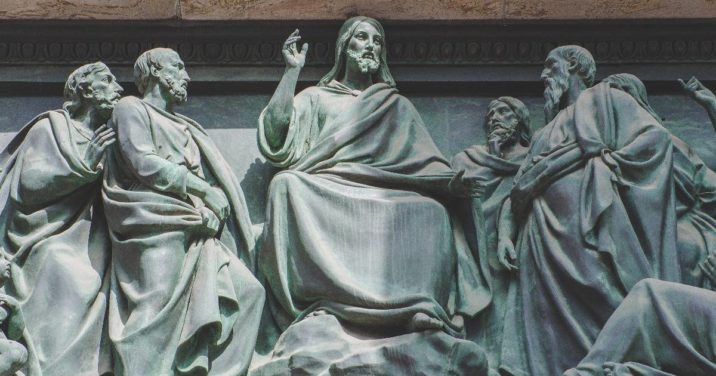Who wrote the Apostles’ Creed? Why is it important? Keep reading! This article from the free Lexham Bible Dictionary gives those answers (and many, many more).
Apostles’ Creed (Symbolum Apostolorum):
A statement of Christian belief that is used by Western churches, both Catholic and Protestant. While it is explicitly affirmed only in Western churches, it reflects traditions that were affirmed officially by the entire Church in the Nicene Creed. Although its roots are much earlier, in its present form it dates to about the eighth century.
The Old Roman Creed
An early version of what later became the Apostles’ Creed, called the “Old Roman Creed,” was in use as early as the second century (Kelly, Creeds, 101). The earliest written form of this creed is found in a letter that Marcellus of Ancyra wrote in Greek to Julius, the bishop of Rome, about AD 341. About 50 years later, Tyrannius Rufinus wrote a commentary on this creed in Latin (Commentarius in symbolum apostolorum). In it, he recounted the viewpoint that the apostles wrote the creed together after Pentecost, before leaving Jerusalem to preach (Symb. 2). The title “Apostles’ Creed” is also mentioned about 390 by Ambrose, where he refers to “the creed of the Apostles which the Church of Rome keeps and guards in its entirety” (Ep. 42, trans. in Saint Ambrose: Letters).
The text of the Old Roman Creed is as follows, with the last phrase (included by Marcellus but omitted by Rufinus) in brackets (Kelly, Creeds, 102):
I believe in God the Father almighty;
and in Christ Jesus His only Son, our Lord,
Who was born from the Holy Spirit and the Virgin Mary,
Who under Pontius Pilate was crucified and buried,
on the third day rose again from the dead,
ascended into heaven,
sits at the right hand of the Father,
whence he will come to judge the living and the dead;
and in the Holy Spirit,
the holy Church,
the remission of sins,
the resurrection of the flesh,
[life everlasting].
The Later Creed
What we now know as the Apostles’ Creed is an enlargement of the Old Roman Creed. The first known occurrence of the Apostles’ Creed, in a form that is nearly equivalent to its final form, is in the Latin tract De singulis libris canonicis scarapsus by the monk Priminius (sometimes spelled “Pirminius”) from the early eighth century. The process by which the Old Roman Creed became the Apostles’ Creed cannot be exhaustively known, though Kelly notes that creeds that are “practically identical” to the Apostles’ Creed began to appear in South Gaul in the fifth century (Kelly, Creeds, 413). Over the next few centuries, the Apostles’ Creed in its final form gained acceptance throughout France and Germany. It was officially recognized by Charlemagne throughout the Frankish Empire in the early ninth century, and was eventually incorporated into the liturgy of the Church of Rome.
The creed as it exists today consists of three main articles, like the Old Roman Creed divided according to a Trinitarian arrangement. The text is as follows (Kelly, Creeds, 369):
I believe in God the Father almighty, creator of heaven and earth;
And in Jesus Christ, His only Son, our Lord,
Who was conceived by the Holy Spirit, born from the Virgin Mary,
suffered under Pontius Pilate, was crucified, dead and buried, descended into hell,
on the third day rose again from the dead,
ascended to heaven, sits at the right hand of God the Father almighty,
thence He will come to judge the living and the dead;
I believe in the Holy Spirit,
the holy Catholic Church,
the communion of saints,
the remission of sins,
the resurrection of the flesh,
and eternal life.
Amen.
Disputed phrases
Grudem argues that the phrase “He descended into hell” is a late addition to the creed. This phrase is commonly understood as a reference to the “harrowing of hell,” which is based on one interpretation of 1 Pet 3:19. The phrase is first mentioned by Rufinus in the late fourth century, and does not appear in any other versions of the creed until AD 650. Rufinus himself notes that the clause “is not added in the Creed of the Roman Church” (Symb. 18), though he includes it in the version of the creed that was accepted by his own church of Aquileia (see Symb. 3). Moreover, Rufinus makes clear that he did not believe Christ literally descended into hell, but rather that the phrase merely meant He was buried. The Greek form of the creed has ᾅδης (hades), which can mean merely “the grave” rather than a place of punishment. Thus a more accurate version would be, “He descended into the grave” or “He descended to the dead” (Grudem, “He Did Not Descend,” 102). This understanding of the phrase is reflected, for example, in Question 50 of the Westminster Larger Catechism.
Instead of “holy catholic church,” some Protestant churches, particularly in the Lutheran tradition, recite “holy Christian church” to avoid misinterpreting the phrase as a reference to the Catholic Church. The creed seems to use “catholic” in the sense of “universal” or “global” (the Latin uses the adjective catholicam); this interpretation fits with the historic nature of the creed, which predates in its tradition the split of the Orthodox and Catholic churches.
Tradition, the “Rule of Faith,” and core Christian beliefs
The Apostles’ Creed seems to represent some form of what the early church called the “rule of faith.” The early Christians were guided by the “rule of faith,” the Holy Spirit working in community and individuals, and the authoritative Scriptures. Before the “rule of faith” was called such, there were general references to the teachings and traditions of the apostles. It is these core teachings that seem to make up the Apostles’ Creed.
Signs of these “core teachings” are seen as early as the New Testament book of Hebrews, which speaks of a need for Christians to grasp and embrace the basic concepts of faith so that they can move into deeper parts of their Christian faith, while at the same time realizing how essential it is that they never depart from a core belief in the real and living Christ (Hebrews 5:11–6:12). The Apostles’ Creed represents a set of uncompromisable core beliefs for Christians. As such, the core tradition of it is also found in the Nicene Creed. The Apostles’ Creed, like all creeds, functions like a filter for orthodoxy; it indicates what is and what is not “Christian.” It is a public profession of belief in historic Christianity.
Watch the Apostles’ Creed
Teach the Apostles’ Creed
In the new book The Apostles’ Creed: For All God’s Children, families can visualize, memorize, understand, and confess the Apostles’ Creed. With a list of Scriptures for further learning and a family prayer, this FatCat book is perfect to read again and again.
Rediscover the Apostles’ Creed
The Apostles’ Creed has united Christians from different times, places, and traditions. It proclaims eternal truths for life today. We believe them, we recite them, but do we build our lives on them?
Rediscover the creed in The Apostles Creed: A Guide to the Ancient Catechism. See what about the Christian faith is so counter-cultural and what truths embedded in the Apostles’ Creed we’ve come to assume—when really they should amaze us.
Get more from your Bible study
When you read your Bible with the free Lexham Bible Dictionary, thousands of articles like this help you understand important concepts, words, people, and more. The Lexham Bible Dictionary syncs with the library inside Logos Bible Software (also available free) to create a never-ending source of insight into topics and passages. In the LBD, this article links to several others, so you can keep learning.
Download the Lexham Bible Dictionary for free today.
* * *








